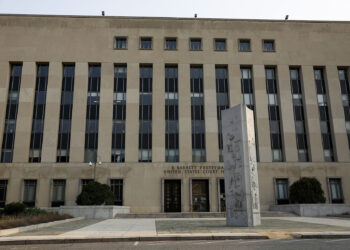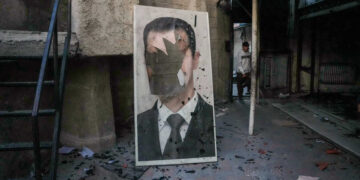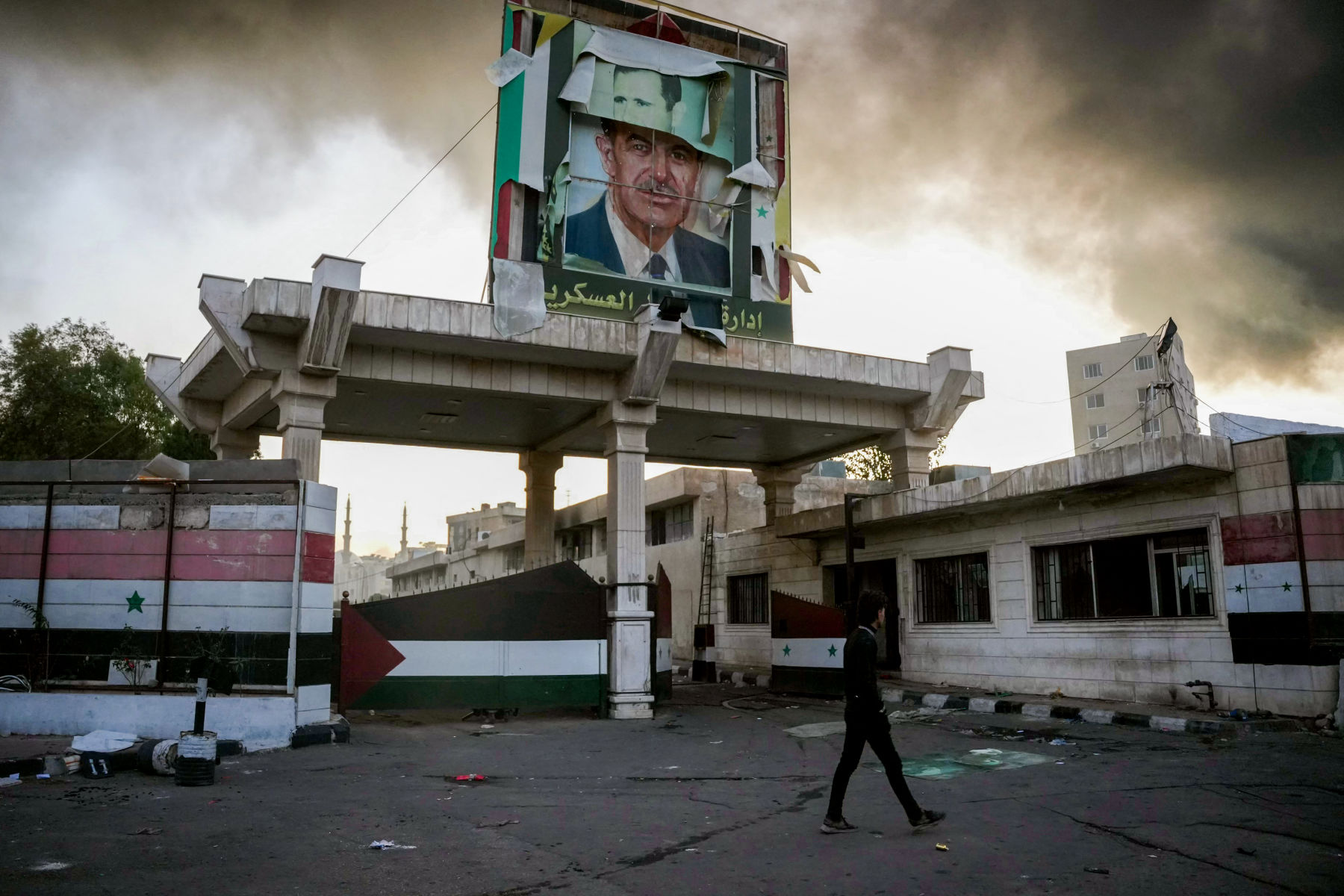Muhammad Kamal is a former research assistant at DAWN, where he worked on human rights protections in Egypt and across the region.
It's hard to imagine not being exposed to the sun for a year or two, just sitting in a cell that you're not allowed to leave. But what's even worse is when you get sick and there is no one there to help you. You realize it is intentional, as the prison systematically deprives detainees of medical care.
In an interview with DAWN, an Egyptian journalist who works for the independent Rassd News Network talks about his detention in the notorious al-Aqrab or Scorpion Prison, south of Cairo, starting in 2013 following his coverage of the protests at Rabaa al-Adawiya Square. He details "one of the severest forms of torture" in the prison: medical negligence.
The former prisoner, who preferred to remain anonymous, reveals how medical treatment is regularly withheld from detainees in Scorpion Prison, who are also deliberately prevented from leaving the prison for urgent medical care. This medical negligence is one of the reasons for the altered physical appearance of many inmates, whose health suffers immensely behind bars. According to the former prisoner, the paltry meals in Scorpion Prison are also smaller than what is offered in other prisons in Egypt.
President Abdel-Fattah al-Sisi's prison-building spree, including the first of several new "American-style" complexes he has touted, won't address this mistreatment. "Prison is a prison, even in a garden," the former detainee says. "Everything the regime does is aimed at improving its reputation overseas. The regime has been exposed, because its repressive practices are not hidden from anyone, nor are they hidden from the international community."
The following transcript has been edited lightly for clarity and length.
Medical negligence in Scorpion Prison is one of the severest forms of torture. It is a systematic practice to kill detainees. The prison administration would routinely withhold treatment.
- Former detainee in Egypt's Scorpion Prison
When, why and how were you arrested?
I was arrested on Aug. 24, 2013, during the security crackdown that followed the dispersal of the Rabaa and al-Nahda sit-ins. I was visiting my friend Mohamed Soltan, an Egyptian-American political activist, at his home in Maadi, who was shot in the shoulder during the Rabaa dispersal. We were arrested, and added to Case 317 of 2013, known in the media as the "Rabaa Operations Room." I worked as a journalist for Rassd News Network, covering the Rabaa sit-in.
What were the charges brought against you?
Leading and joining a group established in violation of the law—without naming that group—and spreading false news.
Where were you first imprisoned?
Tora Istiqbal Prison was the first prison to which I was transferred, after spending a period of time with criminals in the notorious Basateen police station.
Can you describe how you felt when you learned that you were going to Scorpion Prison, which has been called the "cemetery of the living"? Can you describe the conditions inside the prison?
When I and a group of detainees were informed that we would be transferred to the Tora area—at the time I was in Wadi al-Natrun Prison 440—I became hopeful. We were extremely happy that we would leave this damn prison. This prison was a grave in the true sense of the word. I slept in an area of 37.5 cm—an inch and a fist in the language of prisons.
We gathered our belongings, including blankets, clothes, books and other personal items. On the way, we knew that we will pass by Scorpion Prison. We thought that this stop was for the transfer of Dr. Salah Sultan to this prison, and then we would go to Istiqbal Prison or al-Liman. The vehicle entered Scorpion Prison. We were surprised when they told us to get out of the transport vehicle, because our housing would be in Scorpion Prison. I entered Scorpion Prison on Feb. 1, 2016 and was released on June 1, 2016.
We were spotted by an officer who had met us in Istiqbal Prison, and we thought he would treat us well. Unfortunately, we had the worst reception. All our personal belongings were confiscated; they took everything. They left us only one pair of underwear and one blanket. Officers Muhammad al-Ashry and Ihab Samra were responsible for prisoner abuse.
We were housed in the H4 ward in Wing 4. Scorpion Prison consists of four H-shaped wards. The ward is called H, and each ward has four sub-wards called a wing, and each sub-dormitory has 23 cells. Each ward is isolated so that no one knows what happened or what is happening in the other ward.
The wards also have categorical divisions. Each H houses a set of cases in it, meaning that H2 is designated for leaders, because the Muslim Brotherhood leaders are housed in it. As for H3, it is intended for detainees in specific cases such as terrorist groups or ISIS. The inmates are redistributed periodically to ensure instability among them and as a form of psychological and physical abuse.
Exercising, if it happens, is like a dream about getting out of a cell where you've been locked up for months. If you go out once a month for 10 minutes, you have to thank God for this blessing, so that you can move your body for a little while.
Visits, if they take place, are through a glass partition and there is a headset on each side. Food is similar to what is served in every prison, but in much smaller quantities, and it consists of burnt lentils, sour beans, burnt rice, etc. Sometimes it is possible to resort to the cafeteria, but the prison administration sells food at inflated prices, sometimes by 60 percent.
As for haircuts, the barber does not come to prison regularly, he comes once every two or three months. For nail clippers, there is only one clipper per H ward that all prisoners use every few months. Regarding personal hygiene, every three or four months, the prison administration would sell a hair removal cream after the prisoners went on strike. This is the best case in light of the normal situation that I had in prison, but every H ward is treated differently.
Can you tell us about the dispossession campaigns?
Dispossession means confiscation of everything in the cell, which actually has nothing that can be confiscated. The strange thing is that the dispossession can take place every few days. If the guards find a bag in which you put food, it will be confiscated. If they find a blanket that you use as a shower curtain, it will be confiscated. Each inmate has a prison suit; if an inmate has more than one suit, they will be confiscated.
Prison is a prison, even in a garden. Everything the regime does is aimed at improving its reputation overseas. The regime has been exposed, because its repressive practices are not hidden from anyone, nor are they hidden from the international community.
- Former detainee in Egypt's Scorpion Prison
We saw pictures of detainees in Scorpion Prison during their trial, and we noticed that their appearance has deteriorated. What caused that?
The reasons for this are lack of food and lack of exposure to the sun. Imagine people not being allowed to leave their cells for a year or two. There's also the harsh treatment and constant insults, the interrogations that take place in prison, and the torture by the National Security officers, all of which contribute to physical changes.
What about the health conditions and health care in the prison? How does the prison administration deal with the inmates' medical emergencies?
The worst thing in prison is when you feel sick and there is no one to help. A sergeant says arrogantly: "In the morning, when the officer comes." Medical negligence in Scorpion Prison is one of the severest forms of torture. It is a systematic practice to kill detainees. The prison administration would routinely withhold treatment and prevent inmates from going to their follow-up appointments in the central hospital at Istiqbal Prison. The prison would delay the vehicle's departure to Qasr al-Ainy Hospital, so patients would miss their appointments. The prison does not send the medical reports to the medical directorate, who would assign patients' hospital transfers. Patients are prevented from going out to take their medical examinations.
Have you witnessed any deaths in prison? And what are the reasons? How does the prison administration deal with it?
In 2016, I arrived at Scorpion Prison and met a large number of inmates who were regularly tortured. Prison guards hung them in front of the wards. I saw the detainee Ahmed al-Dajawi, who suffered from peripheral neuropathy—nerve damage to the hands, feet, etc. He told me they tortured him at the National Security Agency. He was later executed.
I had not witnessed any deaths in Scorpion Prison, but I had witnessed four deaths in Tora Istiqbal Prison, specifically at the prison's hospital. All of them died as a result of intentional medical negligence. There is no health care inside Tora Istiqbal Prison Hospital.
There are many examples of medical negligence, including withholding treatment, preventing patients from going to follow-up appointments at Istiqbal Prison, where the central hospital is located, delaying the vehicle that transports inmates to Qasr al-Ainy so they would miss their appointments, and failing to send medical reports to the medical directorate, who would assign patients' hospital transfers.
What are the departure procedures for prisoners going to interrogation sessions or trials?
The detainees are escorted from the cells under heavy guard. The names of the prisoners are announced a day before or on the same day of the court session. The detainees are released from the cells at 7:30 a.m. Every three inmates are handcuffed together, and if the inmate is deemed very dangerous, he would be handcuffed alone with his hands behind his back. The transport vehicle is crammed with as many detainees as possible. There are cases in which detainees sustained fractures, due to overcrowding and reckless driving.
There are many students imprisoned inside Scorpion Prison. Does the prison administration allow them to complete their studies?
The prison lacks basic living standards, let alone the prisoner's request to complete his studies. The prison hinders the entry of notebooks and books, or prohibits them completely. According to the law, the lawyer or the families of the detainee can apply to obtain a study record from the university or school, and the exams' schedule as well. These official papers are then sent to the prison sector. Sometimes they are received inside the prison to complete the procedures. But in most cases, the prison administration impedes the students from resuming their education or taking exams. The vast majority are prevented indirectly, by delaying the vehicle that will transport the students to the exam centers or arguing that the exams' schedule is not officially stamped. There are few cases where they are allowed to take exams.
Do you know some of the names of prison officers and guards in Scorpion and Istiqbal prisons?
Yes, but the problem is that all the officers use aliases. I know the officers Muhammad al-Ashry and Ihab Samra, for example.
What do you think of the massive new "American-style" prison complex recently opened by the Egyptian government?
Prison is a prison, even in a garden. Everything the regime does is aimed at improving its reputation overseas. The regime has been exposed, because its repressive practices are not hidden from anyone, nor are they hidden from the international community. The reports that come out every once in a while affirm that the regime will not stop its continuous abuses against detainees. Building a new prison or developing a new human rights strategy is all for media consumption.
What is your message to the Egyptian government?
Eight years of abuses are enough. Stop wasting the lives of prisoners who perish behind prison walls. The release of detainees contributes to the stability and building of the state.
What is your message to the detainees?
Dear ones, I truly miss you. My heart aches for you, and I hope to celebrate your release soon. Forgive us for our shortcomings.
What is your message to the international community and human rights organizations?
Human rights organizations play a major role despite all the obstacles. Their documentation of human rights violations is very important for accountability. Their pressure could facilitate the treatment or release of a prisoner. Please deal with the prisoner as a human being, despite his political or intellectual affiliations.
Although the international community has witnessed human rights violations, extrajudicial killings, and the absence of justice and transparency, it continues to remain silent. I have no comment.





































